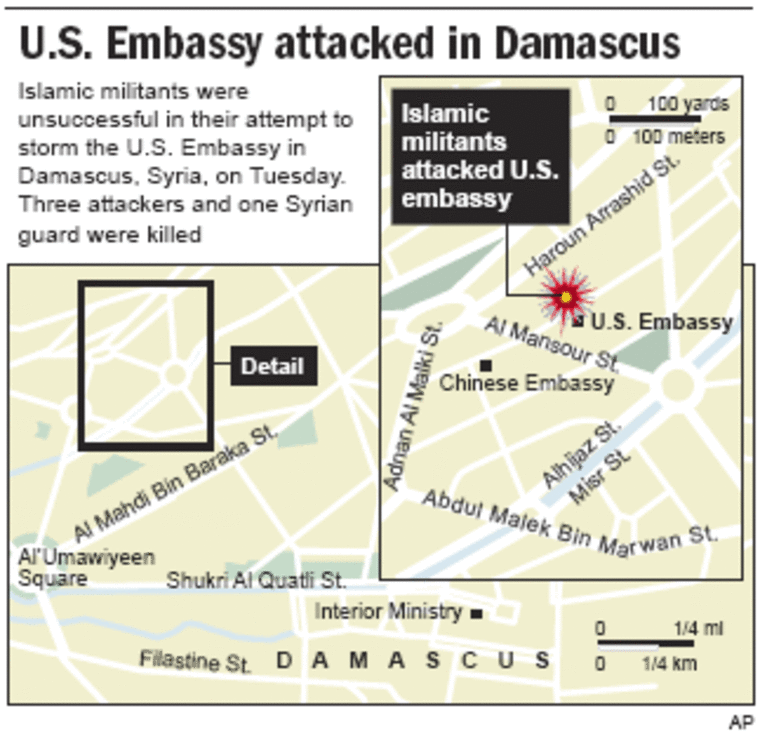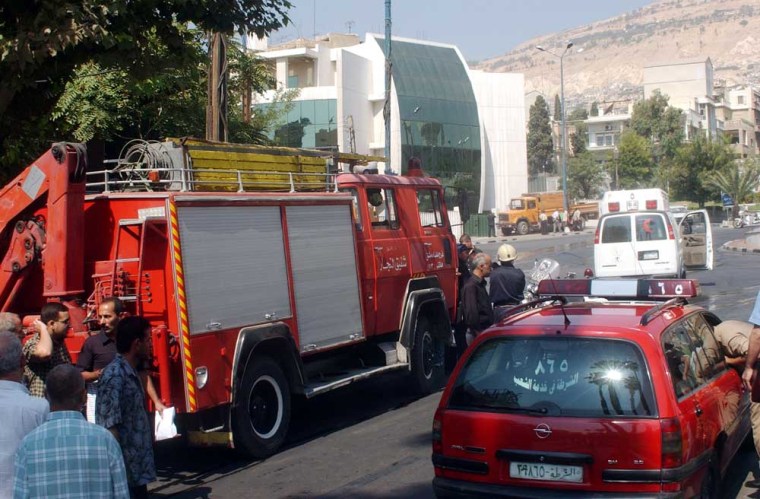Syrian guards foiled an attempt by suspected al-Qaida-linked militants to blow up the U.S. Embassy on Tuesday, exchanging fire outside the compound’s walls with gunmen who shouted “God is great” and tried to storm in with automatic weapons and hand grenades.
The brazen, midmorning assault in a heavily guarded neighborhood of the capital could highlight the Syrian regime’s weakening grip on militants, who have battled Syrian security forces repeatedly in recent years.
The attack, which left at least 10 civilians and a Chinese diplomat wounded, also quickly brought to the surface entrenched differences between the United States and Syria, such as the Palestinian-Israeli conflict, Damascus’ ties with Iran and Hezbollah and the war in neighboring Iraq.
The Bush administration praised Syria’s security forces for their professional response but then called on the country to play a constructive role in fighting terrorism.
“I do think that the Syrians reacted to this attack in a way that helped to secure our people, and we very much appreciate that,” Secretary of State Condoleezza Rice said.
White House spokesman Tony Snow also thanked Syrian officials and called for Damascus to “become an ally and make the choice of fighting against terrorists.”
Syria critical of the U.S.
But Syria responded with a sharp criticism of the United States, blaming its policies in Lebanon, Iraq and the Palestinian territories for increasing Islamic militancy.
“It is regrettable that U.S. policies in the Middle East have fueled extremism, terrorism and anti-U.S. sentiment,” the Syrian Embassy in Washington said in a statement. “The U.S. should ... start looking at the root causes of terrorism and broker a comprehensive peace in the Middle East.”
It curtly said that Syria “performed its duties” under the Geneva Conventions to protect the embassy.

Anti-American sentiment has been rising across the Middle East since Israel’s 34-day blitz of Hezbollah in Lebanon that ended nearly a month ago, on top of turmoil in Iraq that many here blame on the United States.
There was no immediate claim of responsibility for Tuesday’s attack, but suspicion immediately fell on a little-known al-Qaida offshoot called Jund al-Sham, Arabic for Soldiers of Syria.
Syria’s ambassador to the U.S., Imad Moustapha, told The Associated Press it was too early to say but “it’s logically possible” Jund al-Sham was responsible.
If confirmed, it would be the boldest and most sophisticated attack yet by Jund al-Sham.
Attackers unknown
At the State Department, deputy spokesman Tom Casey said: “Clearly, it was an organized terrorist attack on our embassy. But exactly who was responsible for it and who they might be affiliated with and what their motives are, are things that we’ll just have to look at as the days go on.”
Three attackers and a Syrian guard were killed in the attempted bombing of the embassy, located in the same neighborhood as President Bashar Assad’s office and residence. A fourth attacker was wounded and arrested.
The attackers came in two cars, one of them an explosives-laden pickup truck. The first car pulled up in front of the embassy’s entrance and three gunmen burst out. Shouting “Allahu akbar” — “God is great” — they threw hand grenades and fired automatic weapons toward the gate and a Syrian guard post, sparking a 15-minute gunbattle.
At the same time, the truck — filled with pipe bombs rigged to gas canisters — pulled up to another gate on the other side of the triangle-shaped compound. But when the shooting erupted, the driver ran away without detonating it. The driver was shot and arrested, and the truck did not explode.
Grenades thrown
The three attackers tried to throw their grenades over the embassy’s white 15-foot-high walls, but none made it over. One blast peppered the wall with pockmarks.
Three Syrian security agents were wounded as well as the 10 civilians and the Chinese diplomat who was watching the gunbattle from the rooftop of the Chinese Embassy across the street. No Americans were hurt, and the embassy was not damaged.
After the attack, blood was splattered on the sidewalk outside the embassy, along with the burned-out car used by the gunmen.
The U.S. Embassy has about 40 staffers, but no ambassador. The United States withdrew its ambassador several days after the Feb. 14, 2005, assassination of former Lebanese Prime Minister Rafik Hariri in a Beirut car bomb — an attack his supporters blamed on Syria. Damascus has denied any role, but the Hariri’s killing further soured U.S.-Syrian ties.
Tuesday’s attack raised the question of how strong militant groups have grown in Syria — where the highly closed government rarely releases information on security issues, making assessing the terror threat difficult.
Tension with al-Qaida
Sunni Muslim extremists such as al-Qaida fiercely despise Assad’s regime because of its secular ideology and because his father, the late President Hafez Assad, led a crackdown on Muslim fundamentalists that killed thousands in the city of Hama in 1982. They also reject Assad’s rule because he belongs to the Shiite Alawite sect of Islam.

Assad has warned of an increasing Islamic threat against his country, saying al-Qaida militants are taking refuge in neighboring Lebanon.
But some opponents of his regime have claimed he is hyping the threat to score support with the United States, defuse international pressure and provide a pretext for Syrian meddling in Lebanon. The United States accuses Assad’s government of supporting terrorism in its backing of Hezbollah guerrillas and Palestinian militants.
Syrian security forces have battled several times in the past two years with gunmen believed to belong to Jund al-Sham.
In June, anti-terrorism police fought militants near the Defense Ministry in central Damascus in a clash that killed five people and wounded four. In 2004, four people were killed in a gunfight between police and a team of militants believed to plotting to bomb the Canadian Embassy.
Jund al-Sham was established in Afghanistan by Syrians, Palestinians and Jordanians with links to slain al-Qaida in Iraq leader Abu Musab al-Zarqawi.
Syria is a major crossing point for militants from around the Arab world — including Syria and Lebanon — to slip into Iraq to fight in the insurgency. In the face of U.S. pressure, Damascus has insisted it is doing all it can to stop the infiltrations but that the long desert border is too difficult to seal.